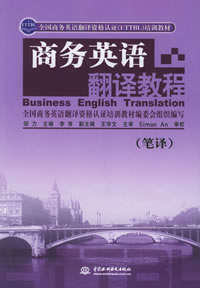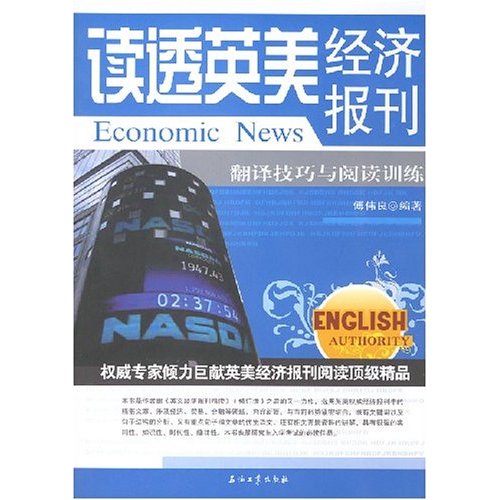Getting Started as a Translator:Gleanings from Honyaku (第三部分)
作者:古龙 2009-07-04




语际翻译公司 转载请注明https://www.scientrans.com
∗本栏目部分文章内容来自互联网,部分已经过本站编辑和整理,如有版权事宜请联系Email/MSN jesczhao@hotmail.com
Steve Harris
________________________________________
Here are some comments from December 1998:
________________________________________
The standard piece of advice for aspiring translators (at least, it's the standard for me) is that finding a suitable subject matter specialty is at least as important as learning the foreign language. Most people who think that they might like translating as an occupation fail to realize that their clients will be paying them to translate specific documents, and this will require the translator to know something (often a lot) about a specific area of human endeavor.
Are you very knowledgeable about a certain area of science or technology? A branch of industry? Financial business? Law? If not, you will probably have a hard time getting much work.
Also, unless you are a phenomenal language learner, I doubt that you can learn enough Japanese by self-study to become a professional translator. It's a damn hard language for English speakers (and vice versa). Assuming that you have at least one of the aforementioned subject areas lined up, I would advise you to spend a few years in Japan, studying the language from professional teachers and acquiring familiarity with the culture.
Once you have satisfied these requirements, we can begin discussing how to find clients. Good luck!
Jon Johanning
________________________________________
In many ways anime/manga/game translations are even more challenging than technical material due to the often-esoteric subject matter and abundant use of colloquialisms. I was raised on a steady diet of Japanese anime myself (go ahead, ask me anything about Gundam :), but I realized how "blind" a translator of pop-culture materials is when I first sat down to do an actual translation of the text of a video game a year or so ago. There simply aren't any reliable study guides or dictionaries available for up-to-the-minute slang and "street talk." It's a "you know it or you don't" sort of thing, and there's no way around the fact that living in Japan is the best way to pick up that knowledge.
Matthew Alt
________________________________________
> I think that most people outside the field seriously
> underestimate the level of language skill needed
> for translation.
That's funny: I've noticed that many people in the field seriously underestimate the level of language skill needed for translation.
Ryan Ginstrom
________________________________________
I don't know any other translator who said they started out wanting to be a translator. Not that there aren't people who do become a translator because it was a long-time goal. But in the case for Japanese, I think it takes at least five to six years of relevant experience and training (learning) to become proficient at any level of translation above the very very low value-added end. I graduated from one of the major Japanese national universities with a major in economics, did all my course work in Japanese, and it's only been in the past four years or so that I have felt comfortable enough to call myself a 'translator'. For Japanese, anyway, it just takes a lot of committment and dedication to set your sights that far ahead - which is why most JPN-ENG translators sort of fall into the field.
I also never really set out to be a translator - my interest was economics and finance, and that's what I was doing when I sort of backed into translation. Of course, the intense field work from previous jobs was a major help. Other people have suggested it and implied it, I will say very directly - if you don't have a solid background in a particular field or hobby (a friend of mine makes a very good living in Europe translating from French to Japanese material on chess, an old hobby of ours from university days - he'd starve to death in the States), it is almost impossible to become a translator. Obviously, having a broad, general and diverse background of Japanese (being exposed to a variety of fields and experiences) will help you diversity across fields, which may help if demand in one particular field suddenly dries up - but ultimately, you need English knowledge of the work you're doing to be a good translator - knowing the Japanese is useless if you don't know how to make it sound natural in English. Just ask any other translators - even the best of them will struggle outside a field they feel comfortable in (myself included, and I'm not even one of the best of them).
- 评论
- seme:文章内容文章内容文章内容文章内容文章内容文章内容文章内容文章内容文章内容 章内容文章内容文章内容文章内容文章内容
- seme:文章内容文章内容文章内容文章内容文章内容文章内容文章内容文章内容文章内容 章内容文章内容文章内容文章内容文章内容

- 谈翻译观念的嬗变与翻译技能的训练
2009-6-15 15:33:10 - 《高等学校英语专业英语教学大纲》中规定,大学生通过四年的在校学习,“能运用翻译的理论和技巧,将英美报刊上的文章以及文学原著译成汉语,或将我国报刊、杂志上的文章和一般文学作品译成英语……。译文要求忠实...
- 翻译与网络营销
2009-6-11 0:02:31 - Translation and Your International E-Commerce Strategy Most businesses realize that they ...
期刊征稿
- 第四届IEEE生物信息与生…
2009-6-30 19:42:01 - 基本信息 主办单位: 四川大学,IEEE生物医学工程协会(EMBS) 承办单位 开始日期 2010/06/18 结束日期 截稿日期 2009/1...
- 第九届全国光电技术学术…
2009-6-30 19:35:58 - 基本信息主办单位: 中国宇航学会光电技术专业委员会承办单位 开始日期 2009/11/01结束日期 截稿日期 2009...
















